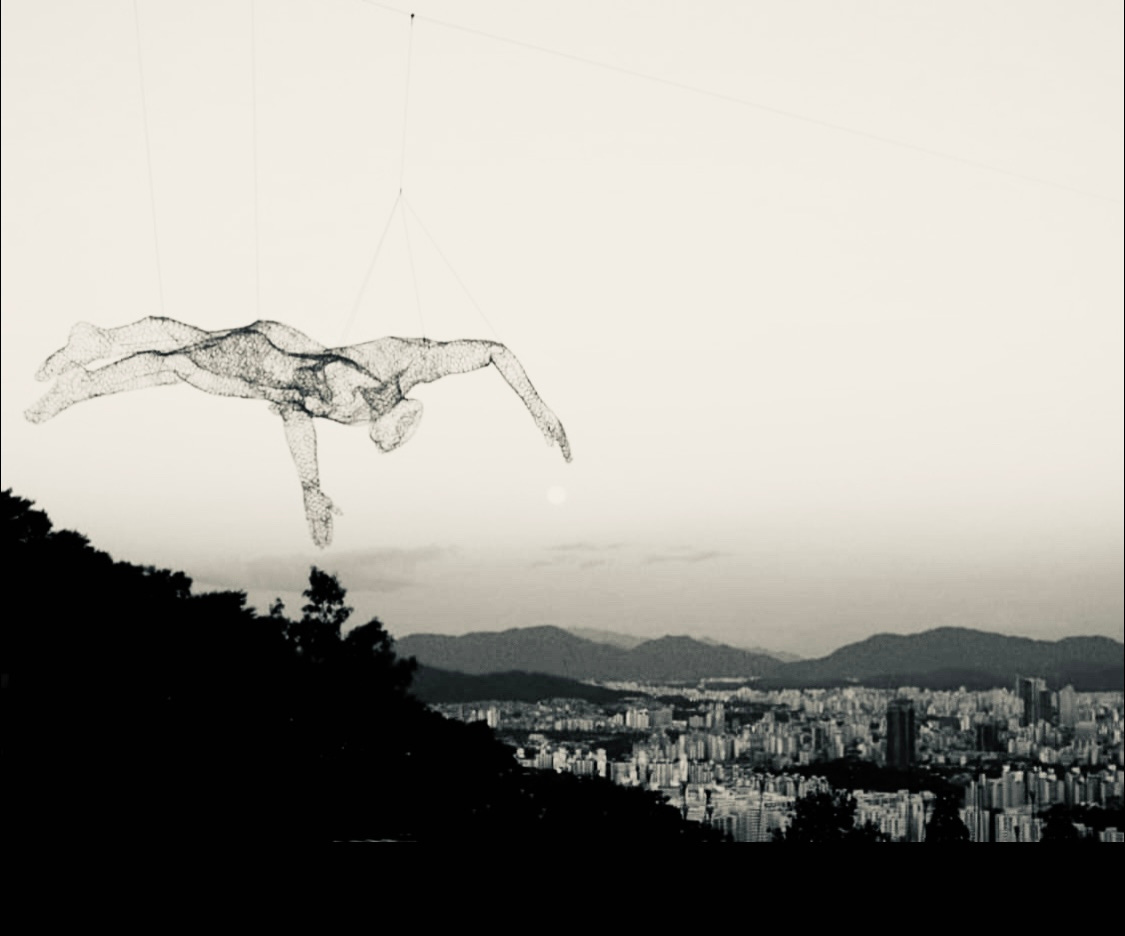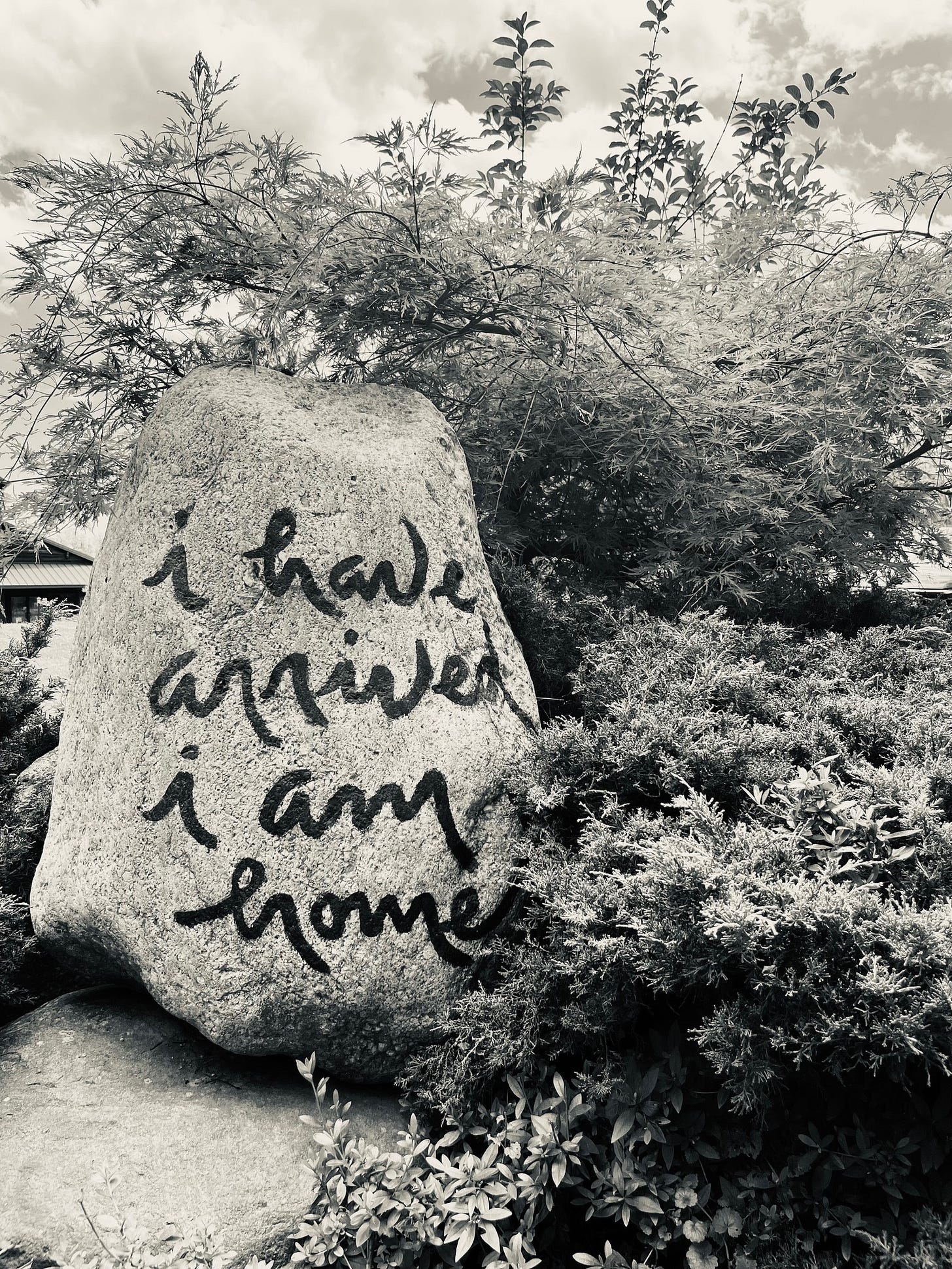You can always return
When leaving something old or starting something new, we need a little help from our friends.
Home is where I want to be
But I guess I'm already there
— Talking Heads
Two weeks ago, we moved out of our home north of New York City, and into a small cabin in the Catskills for the month of July. We’ll ultimately land in Massachusetts this fall, for the forseeable future. My partner grew up in North Attleboro, MA, and I lived in Boston for several years during college and afterwards, before leaving to move to Asia. So while this move feels like a fresh new direction for our family, it is also a welcome homecoming.
This transition has had me thinking recently of how I came to be serious about mindfulness, while setting out along that path. The path that first took me away, and is now leading me back home.
Perhaps you too have such a story. Below is mine.
Welcome to In Tending (fka Initiation Writes)! This is a newsletter exploring the intersections between mindfulness and caregiving. Most posts here are free, but I’m working on some affordably-priced offerings coming up in the fall that may be of interest. More on that below. For now, if you’re not already signed up to receive the free stuff, you can do so here:
Thanks so much for reading! 🙏
My move to Asia, like this one we are in now, was motivated in part by feeling drawn to having a smaller and simpler life. At least, I hoped it would be like that. It was also motivated by feeling as though I had some self-sabotaging habits to break, and I needed to make a big change in order to do so.
One of those habits, among many, was smoking. In the early aughts, I was not the middle-aged, monklike mother and teacher I am now. I was a journalist in my twenties who wrote about music and food. At that time, the writers and musicians and chefs I spent my time around smoked cigarettes, and I’d often take them when offered. It was actually quite a helpful habit, then, an opportunity to step outside, take some deep breaths, and have some focused time to talk with just one person, especially if they were a possible source (or a possible crush). I remember those conversations fondly, if not the cigarettes themselves.
When I moved to Korea and became a teacher, I vowed to say goodbye to all that.
Seoul in the early aughts, however, was even more smoke-riddled than the puritanical city I’d left. Cigarettes were cheap, and people smoked them everywhere — in the clubs, on the streets, and even on the crowded mountain trails. I suppose I imagined that becoming a teacher might place me in more buttoned-up company than the tattooed chefs and whiskey-swilling writers I’d left behind, but the work culture at my school was like that of many other Korean workplaces — built around long hours during the day, followed by long nights of drinking, smoking and singing K-pop songs in karaoke lounges.
I welcomed these opportunities to bond with my coworkers at first. We hailed from all over — not just Korea, but Australia, Ireland, Canada and the U.S. — this holy trinity of intoxicants helped us all to manage the anxiety that comes with communicating across several cultural and linguistic boundaries at once, with half of us speaking in our second language at any given time. (Not to mention — cringe — singing.)
When a pack of my own cigarettes materialized in my bag for the first time, however, and I began smoking them even when by myself, in lonely moments on my doorstep in Mok-dong, I knew I was in trouble.
I had watched my parents try and fail to quit smoking over and over, and now, half a world away, I was caught in the grip of the same cycles. Like them, I realized I had never really been taught to work with the sensations that came up when I tried to resist or quit, well, anything. How could I quell the anxiety around whether I would be able to navigate my internal experience, or the fear of missing out on connecting with something or someone around me? And what about the deeper fears I was feeling — that I was lacking something, something unnameable and elusive, and that no matter how hard I looked, how deeply I read, or how far I traveled, I would never, ever find it?
From reading Comfortable With Uncertainty by Pema Chödrön, one of the few books from home I had squeezed into my suitcase, I knew that I was feeling craving and suffering. I had been reading her instructions on things like sitting meditation and releasing thoughts as they arose. I had removed what I thought were all the negative influences on me back at home so that I could be free to practice these skills. But I realized that I was missing a crucial element of success in mindfulness, what Buddhists call The Three Jewels: not just cultivating personal insight and motivation (the first jewel) or connecting with texts and teachers (the second), but with community. Sangha.
Having sangha means having the company of wise and loving beings in your life who can remind you of who you are and who you are trying to be. It means getting to connect with yourself in the company of other people who are developing this same capacity. It means learning from the example of people who have already cultivated the power to step outside, take some deep breaths, and give other people their full attention in conversation, without a cigarette in hand.
The irony was that I had many friends like this in the States, and very few in South Korea. In setting out to seek my fortune in a new place, I had left this priceless third jewel behind. Oops.
It was very lucky that one such friend came to visit me a few months into this new adventure – my oldest childhood friend, Karen. Since we both grew up in Utah, we were excited to spend our time together hiking in the mountains, as we did as children. However, during a hike up Mt. Namsan, in the center of Seoul, I found that I couldn’t keep up with her. My lungs were straining. My brain was crying out for nicotine. My budding mindfulness practice only made me more aware of these unpleasant sensations. I caved under the pressure. We stopped halfway up a hike to the top so that I could sit on a bench and light up.
My friend didn’t say anything. She just sat companionably next to me, though I could tell she was surprised. Suddenly, I saw myself through her eyes. Struggling, clearly, but still lovable and worthy. Worthy of something better than this. Worthy of being able to breathe freely, all the way to where I wanted to go.
In the end, I did not break this cycle of suffering because I experienced some massive surge of internal willpower. Nor did I do it even after making massive changes to my external surroundings.
I broke my “bad” habit because my friend did not treat me like I was bad. Because she gave me, instead, a felt sense of being held in genuine, non-judgmental compassion. And that helped me to begin offering it to myself.
After my friend left, I threw away my last pack of cigarettes, and I bought a bicycle. I started riding it in the early mornings before work instead of staying out late with my coworkers. At first, I felt lonely. But now I knew what I was looking for.
Once I’d recovered the full use of my lungs, I biked over to the International Seon Center, a Zen temple and educational center. Soon I had made the acquaintance of some friendly bilingual monks there, who invited me to come back if I liked. As the summer tipped into fall, and fall into winter, I continued to visit. I brought friends. We had tea.
I also discovered a small temple close to my home on one of my rides, and when I couldn’t bike to the ISC, I would sit there under the trees, trying to ignore the puzzled looks the Koreans gave me as they entered to do their prostrations or to sweep the wooden floors. I was the only white American woman in my entire neighborhood, and thus quite an oddity, albeit a welcome one; sometimes the other folks at the temple would invite me to join them in their meals, excited to have a chance to practice their English with a friendly lady waygukin (foreigner). Especially a fellow meditator. One even invited me to her home to learn how to make kimchi from scratch.
These joyful moments of sangha filled my days and brought me connection. When I sat alone at home, however, it was still often tough going. Some days, I was exhausted – a common side effect of starting a meditation practice. You realize how tired you are, how fast and hard you have been running. I would often fall asleep. Some days I’d even miss my practice window entirely, snoozing through my alarm and then dashing, panicked, straight to work to teach.
One day, I confessed this to one of my new Zen monk friends over tea.
“I’m really having trouble maintaining my practice. I still can’t seem to stick with it some days,” I said, a little sheepishly.
“Oh, you don’t have to worry about maintaining anything,” said my friend, cheerily, as he set out our cups. “You just notice when you forget, and when you notice, remember to come back. You can always return. The practice is about that. It’s not about maintaining. It’s about returning.”
This, to me, is one of the things I continue to love most about the world of mindfulness. No matter where you go in the world, the practice, the teachings, and the fellow meditators you meet can all serve to remind you of this compassionate truth:
No matter where you are, or how far away you have gone, you can always return.







Beautiful essay. May we all have a wonderful friend like Karen to see our true selves in moments of suffering!
I’m a couple weeks into my latest attempt at a mindfulness practice. I love the notion that as soon as you realize that you’re not being mindful, you are practicing. This takes the pressure off. Thank you for your beautiful words!